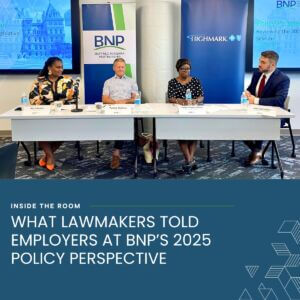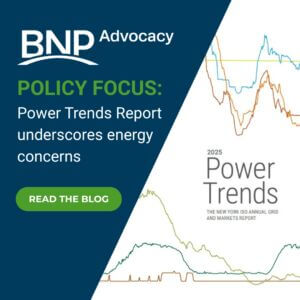UU Analysis: NYHA Will Add Costs, Eliminate Jobs
Blog Categories
May 15, 2021
Upstate United, a BNP partner organization and non-partisan, pro-taxpayer, pro-economic growth, and pro-Upstate education advocacy coalition, recently analyzed the research on the potential economic impact of the New York Health Act (NYHA).
NYHA would move all state residents onto public plan
If enacted, the NYHA would impose a single-payer healthcare system for all New York residents. The bill would force New Yorkers off their private health plans and instead put all state residents onto a public plan. Doing so would increase wait times, decrease access to quality care, repel top doctors from working in our state, and put many New Yorkers out of work.
Cuomo: A state-level single payer system is not feasible
Although any single-payer healthcare system has flaws, a state-level single payer system would be particularly problematic. The historic tax increases imposed by this bill would likely drive New York’s highest earners to move to neighboring states. Additionally, offering this level of care to all residents would draw high-need patients from around the country to move to New York. In other words, a state-level single-payer plan would attract those with the highest medical costs and drive out the taxpayers needed to finance the program. Governor Andrew Cuomo has taken the position that a state-level single payer system is not feasible, pointing to failed attempts in Vermont and California.
 Upstate United’s analysis confirms the suspected problems with the NYHA, noting that the Act would cause:
Upstate United’s analysis confirms the suspected problems with the NYHA, noting that the Act would cause:
- An additional $253 billion in payroll taxes on employers and workers.
- A loss of 161,000 jobs statewide, including 50,445 in the Upstate region.
- A disproportionate number of job losses in Erie County.
UU’s full fact sheet is available here.
Realities of Single Payer recently released a toolkit to help employers understand and communicate with lawmakers about the consequences of the New York Health Act. The toolkit is available here.
Upstate United is a non-partisan, pro-taxpayer, pro-economic growth and pro-Upstate education and advocacy coalition made up of business and trade organizations from across Upstate New York.
Related Posts
Election night wrap-up: Who won and what it means for Buffalo Niagara
Buffalo Niagara voters made their voices heard on Nov. 4 in a series of key local races. Based on unofficial vote tallies, here’s a look at who won and what’s next for our region’s leadership, courtesy of Buffalo Niagara Partnership Director of Government Affairs Josh Veronica.
Inside the room: What lawmakers told employers at BNP’s 2025 Policy Perspective
The BNP hosted Policy Perspective, a piece of the BNP’s annual Government Affairs series. The standing-room-only crowd heard from three of our region’s most influential lawmakers: Assembly Majority Leader Crystal Peoples-Stokes, Senator April Baskin, and Senator Patrick Gallivan. The lawmakers spoke on a panel moderated by BNP Director of Government Affairs Josh Veronica.
Bridging the Gap Conference Strengthens New York’s Semiconductor Supply Chain
Blog Back to Our Blog The University at Buffalo’s Bridging the Gap: Activating the Semiconductor Supply Chain Network conference connected leaders, manufacturers, and regional stakeholders for a two-day conversation on how to grow New York’s presence in the global semiconductor industry. Held July 15-16 at the UB Center for the Arts and Alfiero Center, the…
Policy focus: Power Trends Report underscores energy concerns
The New York Independent System Operator released its annual Power Trends report, which details the state of New York’s electric grid. The report’s findings are concerning and underscore the need for a more sensible approach to climate and energy policy.




